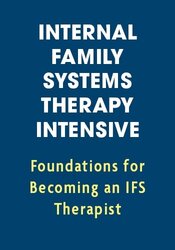
×

IFS therapy is one of the fastest growing treatment approaches in the field – because it works! It’s a non-pathologizing, evidence-based method uniquely designed to work directly with the client’s internal world – accessing protective mechanisms, healing deeply held wounds, and creating transformational change that lasts. And Now you can take your first step in the journey to become an effective IFS therapist. This is a rare opportunity to learn IFS directly from one of the leading experts in the field, Solo Lead Trainer, Elizabeth Taeubert.
This product is not endorsed by, sponsored by, or affiliated with the IFS Institute and does not qualify for IFS Institute credits or certification.
NOTE: Tuition includes one free CE Certificate (participant will be able to print the certificate of completion after passing the online post-test (80% passing score) and completing the evaluation). Instructional methods will include PowerPoint, didactic lecture, and others.
Continuing Education Information: Listed below are the continuing education credit(s) currently available for this non-interactive self-study package. Program content is reviewed periodically per accrediting board rules for currency and appropriateness for credit. Credit approvals are subject to change. Please note, your licensing board dictates whether self-study is an acceptable form of continuing education, as well as which credit types are acceptable for continuing education hours. Please refer to your licensing board's rules and regulations. If your profession is not listed, please contact your licensing board to determine your continuing education requirements and check for reciprocal approval.
For other credit inquiries not specified below, please contact info@pesi.com or 800-844-8260 before purchase.
Materials that are included in this course may include interventions and modalities that are beyond the authorized practice of your profession. As a licensed professional, you are responsible for reviewing the scope of practice, including activities that are defined in law as beyond the boundaries of practice in accordance with and in compliance with your profession's standards.
For Planning Committee disclosures, please see the statement above. For speaker disclosures, please see the faculty biography.
Earn up to 18.0 CE hours. Please see below, for more details, as credit amounts vary by jurisdiction and profession.
PESI, Inc. is approved by the Canadian Counselling and Psychotherapy Association to offer continuing education for counsellors and psychotherapists. PESI, Inc. maintains responsibility for the program. This self-study activity is approved for 18.0 credit hours.

PESI, Inc., #1062, is approved as an ACE provider to offer social work continuing education by the Association of Social Work Boards (ASWB) Approved Continuing Education (ACE) program. Regulatory boards are the final authority on courses accepted for continuing education credit. ACE provider approval period: January 27, 2023 - January 27, 2026. Social workers completing this course receive 18.0 Clinical continuing education credits.
Course Level: Intermediate Format: Recorded asynchronous distance. Full attendance is required; no partial credits will be offered for partial attendance.
Canadian Social Workers: Canadian provinces may accept activities approved by the ASWB for ongoing professional development.
PESI, Inc. is approved by the Canadian Psychological Association to offer continuing education for psychologists. PESI, Inc. maintains responsibility for the program. This program is approved for 18.0 self-study continuing education hours. Full credit statement at: www.pesi.com/cpa-statement
This self-study activity qualifies for 18.0 continuing education clock hours as required by many national, state and local licensing boards and professional organizations. Save your activity advertisement and certificate of completion, and contact your own board or organization for specific requirements.
| File type | File name | Number of pages | |
|---|---|---|---|
| Manual - Internal Family Systems Therapy Intensive (15.8 MB) | 95 Pages | Available after Purchase |

Elizabeth Taeubert, LCSW, RN, MS, is a lead trainer for the IFS Institute and has led IFS trainings both domestically and internationally. She has worked extensively with clients healing from PTSD and complex trauma. Additionally, she provides individual and group consultation to IFS clinicians. Elizabeth holds an MSW from George Williams College in Aurora, Illinois and an MS from DePaul University in Chicago.
Speaker Disclosures:
Financial: Elizabeth Taeubert maintains a private practice. She has no relevant financial relationships with ineligible organizations.
Non-financial: Elizabeth Taeubert is an author with Psychotherapy Networker and is a member of the National Association of Social Workers and the Internal Family Systems Association.
Access never expires for this product.
Visit our FAQ page at https://www.pesicanada.ca/faq or contact us at https://www.pesicanada.ca/contact-us.
DAY 1: Foundations of IFS and Working with the Protective System
DAY 2: The IFS Process of Healing: Working with Exiles and Deep Wounds
DAY 3: Treating Trauma and Enhancing your IFS Practice with Neuroscience
| 5 |
|
| 4 |
|
| 3 |
|
| 2 |
|
| 1 |
|
Satisfaction Guarantee
Your satisfaction is our goal and our guarantee. Concerns should be addressed to info@pesicanada.com.
Please wait ...